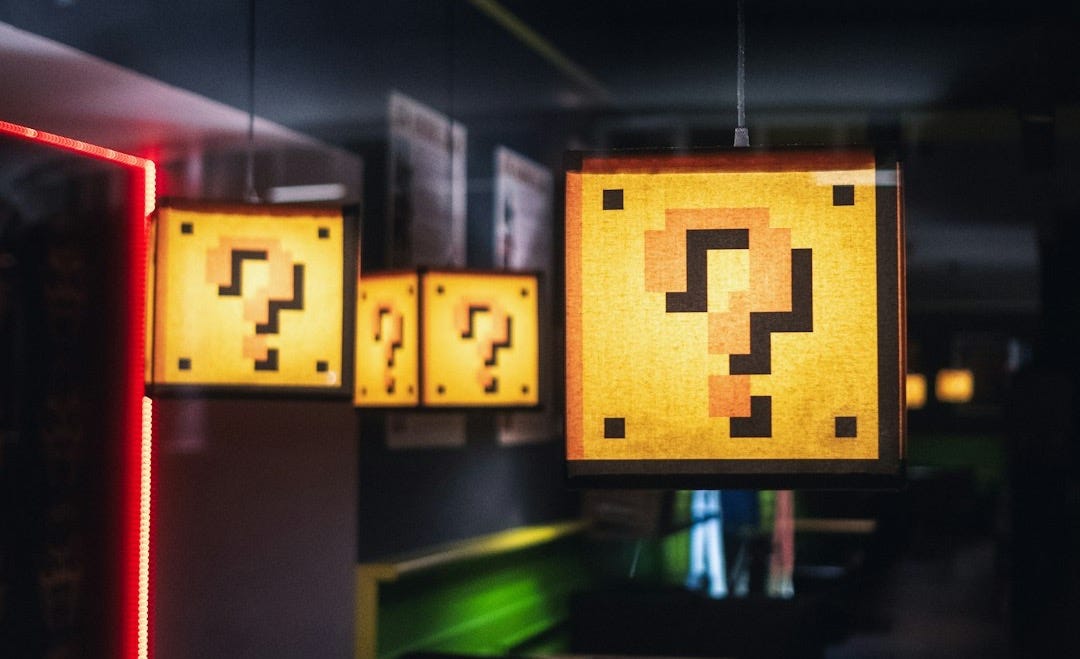Science Shorts: Video games in research (Sept. 2024)
Issue #1 is about rice farming, gaming disorder, and decision making
I toyed around with calling this subsection Fascinating Finds but I think Science Shorts sounds sexier. Plus, I just got to use an alliteration.
Hello JOMT Reader!
I hope you are doing well this Back-to-School season!
I’m going to start off this week with non-gaming science news because I’ve mentioned a THEORY OF EVERYTHING in past issues.
But this time, it’s a real THEORY OF EVERYTHING.
Physicists in Thailand and China have finally found what physics has been wrestling with since the days of Einstein and quantum mechanics. Einstein discovered an equation that described our physical world, from the microscopic to cosmic scales. But quantum mechanics, which describes our world at the atomic and subatomic levels, didn’t quite fit with Einstein’s equations. Physicists ever since have been chasing the Holy Grail that unites these two descriptions of the world.
This article is the Holy Grail that demonstrates how quantum mechanics and Einstein’s equations can be combined into one THEORY OF EVERYTHING. We can literally zoom in and out of our world with this equation. And I’m personally excited for answers to important questions like:
What is at the center of a black hole?
IMPORTANT UPDATE: I posted about why there hasn’t been more hype around this theory, and it appears that several scientists have challenged this group’s findings. There’s always some turmoil within the community when something new is discovered — let’s see how this all plays out!
TL;DR
Who said games are just for entertainment? Why not be entertained and let it inspire your career? The game, Sakuna: Of Rice and Ruin, inspired someone to get into rice farming, showing that games can have a profound impact on our lives beyond entertainment.
I’ve always been told that gaming too much will lead to addiction. But that may not be the case: why you play may be more important than how long you play.
If a game can influence your career choice, why can’t it help you with decision-making in general? There are four potential mechanisms of how this happens using games.
Gaming to become a farmer
Link to article: https://www.frontiersin.org/journals/computer-science/articles/10.3389/fcomp.2024.1392862/full
Title: Virtual play and real connections: unpacking the impact of rice farming simulation video games
I’ve always thought that the question, “What do you want to be when you grow up?”, is an unfair question to ask. It’s especially true for younger children as they may not know all of the possible things they could be. What’s more, even as an adult, the jobs that are available now could change in the future.
What if you could get around that problem by introducing different jobs as games? Researchers studied how a farming simulator game, Sakuna: Of Rice and Ruin, was used to generate interest in rice farming in Japan. Exposure to the game (playing or watching) got 18% of the participants to be more interested in rice farming, with about half of them expressing a desire to transition from interest to action.
The numbers aren’t astronomical, and the researchers note that there are other barriers preventing people from taking action to become rice farmers. However, one of the participants started rice farming after playing the game and used the knowledge they gained in the game to help start rice farming.
Wouldn’t it be cool if we could play games to see what we could become?
Why, not how long

Link to article: https://www.frontiersin.org/journals/psychiatry/articles/10.3389/fpsyt.2024.1443091/abstract
Title: High immersion/escapism motivation makes gaming disorder risk less dependent of playtime among highly engaged male gamers
Gaming disorder is a condition characterized by reduced control over gaming habits, often leading to negative consequences in life. Most people believe that repeated, early exposure and time spent playing games are the most influential factors for gaming disorder.
But it’s probably not that simple and there are other factors that affect the relationship between gaming time and gaming disorder. The researchers looked at why gamers were playing games and whether the reason they played affected this relationship.
They found that the relationship between gaming time and gaming disorder weakened for gamers who played to immerse themselves in a game or escape from reality. Put another way, gamers didn’t need to spend a long time playing games for gaming disorder to set in if they were motivated to play for immersion/escapism reasons.
Our previously simplistic view/understanding of how gaming affects us is finally starting to take on a more nuanced perspective with studies like this one.
Playing games to save the environment

Link to article: https://www.frontiersin.org/journals/psychology/articles/10.3389/fpsyg.2024.1455005/abstract
Title: Exploring the Role and Mechanisms of Environmental Serious Games in Promoting Pro-Environmental Decision-Making: A Focused Literature Review and Future Research Agenda
We’ve already seen how games can be useful beyond entertainment. But can we get from merely generating interest and awareness to action with real-life consequences?
Using environmental serious games, researchers propose four mechanisms by which such games could get someone to change their behaviour. These mechanisms, in turn, could be used to design new games that target different behaviours that could be taken.
I’m curious about what these mechanisms are but unfortunately, the full article is not yet available as it is currently undergoing review. I’ll be giving this a closer look though, once it is available!
If you liked what you read, please consider giving this post a like and sharing it with your community! Have any of you considered a career change after playing a game? Let me know in the comments below!





Well, my brother-in-law played Euro Truck Simulator for months, now he drives a truck through Europe ;-)
A lot to think about here. I saw the news about the theory of everything, but I see some scientists have also rubbished the paper, especially its maths. You're in the right circles - what do your peers think?
The escapism finding about games is true. I've seen this happen to friends, using gaming as a coping mechanism. Usually, the excessive gameplay time is a symptom, not a cause.
I think this is actually an important revelation about addiction. The issue is not exposure but mindset at the time of exposure.